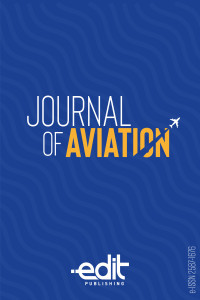Understanding the Role of Corporate Social Responsibility on Internal Customer Satisfaction for Sustainable Business Strategy; A Qualitative Research in the Aviation Industry
Corporate Social Responsibility, Internal Customer Satisfaction, Aviation Management, Strategic Management, Sustainability
Understanding the Role of Corporate Social Responsibility on Internal Customer Satisfaction for Sustainable Business Strategy; A Qualitative Research in the Aviation Industry
Corporate Social Responsibility, Internal Customer Satisfaction, Aviation Management, Strategic Management, Sustainability,
___
- Acuner, T. V. (2001). Toplam Hizmet Kalitesi Yönetimi ve Müşteri Memnuniyetini Sağlamadaki Rolü. Pazarlama Dünyası, 61-64.
- Akdemir, A. (2014). Yeni Ekonomide ve Yeni Dünyada İşletmecilik. Kocaeli: Umuttepe Yayınları.
- Akım, F. (2004). Sağlık Alanında Gerçekleştirilen Sosyal Sorumluluk Kampanyalarının Bireyde Farkındalık ve Davranış Değişikliği Yaratma Etkisi:''Kalbini Sev Kırmızı Giy Kampanyası''Üzerine Bir Değerlendirme. İstanbul Üniversitesi İletişim Fakültesi Dergisi, 8.
- Arastaman, G., Fidan, İ. Ö., & Fidan, T. (2018). Nitel araştırmada geçerlik ve güvenirlik: Kuramsal bir inceleme. Van Yüzüncü Yıl Üniversitesi Eğitim Fakültesi Dergisi, 15(1), 37-75.
- Aydede, C. (2007). Yükselen Trend Kurumsal Sosyal Sorumluluk. İstanbul.
- Bayraktaroğlu, G., İlter, B., ve Tanyeri, M. (2009). Kurumsal Sosyal Sorumluluk-Pazarlamada Yeni Bir
- Paradigmaya Doğru. İstanbul.
- Brink, P. J. (1991). Issues of reliability and validity. In J. M. Morse (Ed.), Qualitative nursing research: A contemporary dialogue (pp. 164-186). Newbury Park, CA: Sage.
- Cecily, S. (2022). Factors Influencing Customer Satisfaction as Well As Internal Processes: A Research Study. International Research Journal of Modernization in Engineering Technology and Science, 250-255
- Corporate Social Responsibility and Environmental Management. (2006). Corporate Social Responsibility and Environmental Management Volume 13, issue 5, 245-260.
- Çolakoğlu, O.E. ve Gürdoğan, A. (2017). Çağdaş Yönetim Teknikleri. Çağdaş Yönetim Teknikleri (s. 20-300). Ankara: Detay Yayıncılık.
- Dinçer, Ö. (2013). Stratejik Yönetim ve İşletme Politikası. İstanbul: Beta Basım.
- Journal Of Air Transport Management. (2008). Journal Of Air Transport Management Volume 14 ıssue 4, 188- 196.
- Kalder. (2020, 10 16). EFQM Mükemmellik Modeli. 11 11, 2011org tarihinde Kalder: http://www.kalder.org/efqm_mukemmellik_modeli
- Kotler, P. and Lee N. (2017). Kurumsal Sosyal Sorumluluk. (S. Kaçamak, Çev.) İstanbul: Yaylacık Matbaa.
- Maxqda. (2022, Haziran). Maxqda The Art Of Data Analysis. https://www.maxqda.com/ adresinden alındı
- Miles, M.B. and Huberman, A.M. (2015). Nitel Veri Analizi. Ankara: Pegem Akademi Yayıncılık.
- Nakip, M. ve Çoban, S. (2007). Yıldırma (Mobbing) olgusunun içsel pazarlama ile ilişkisi. Nevşehir' de bulunan bankalar örneği. Atatürk Üniversitesi İİBF Dergisi, 307-321.
- Sökmen, A. (2013). Örgütsel Davranış. Ankara: Detay Yayıncılık.
- Sandelowski, M., & Barroso, J. (2002). Reading qualitative studies. International Journal of Qualitative Methods, 1, (1), 74-108
- Tanyaş, B. (2014, Nisan). Nitel Araştırma Yöntemlerine Giriş: Genel İlkeler ve Psikolojideki Uygulamalar. Eleştirel Psikoloji Bülteni.
- Taşkın, E. (2000). Müşteri İlişkileri Eğitimi. İstanbul: Papatya Yayıncılık.
- Toksarı, M. (2012). İçsel pazarlama uygulamaları bağlamında iç müşterinin çalıştığı işyerinden tatmin olma düzeyi ile demografik özellikleri arasındaki farkların tespitine yönelik bir çalışma. Erciyes Üniversitesi Sosyal Bilimler Enstitüsü, 155-183.
- Torlak, Ö. ve Altunışık, R. (2012). Pazarlama Stratejileri. İstanbul: Beta.
- Türk, M. (2004). Perakendeci İşletmelerde Personelin Fiziksel Özelliklerinin Müşteri. Fırat Üniversitesi Sosyal Bilimler Dergisi, 274-275.
- Türk, A. (2018). Değişim ve Örgüt Kültürünün Çalışan Performansı ile İlişkisi: Sivil Havacılık Sektöründe Bir Uygulama. İstanbul.
- Yalman, Y. ve Çonkar, M.K. (2020). Türkiye’de, İşletmelerin Çalişanlarina Yönelik Kurumsal Sosyal Sorumluluk Faaliyetlerinin Kurumsal İtibara Etkisi. Uluslararası Ekonomi, İşletme ve Politika Dergisi,383-408
- Yayın Aralığı: Yılda 3 Sayı
- Başlangıç: 2017
- Yayıncı: Vedat Veli ÇAY
Çiğdem BOYACILAR ÇAĞLAR, Abdullah TÜRK
Bekir Alper YILDIRIM, Deniz ELBER BÖRÜ
Duygu TOPLU YAŞLIOĞLU, İbrahim Zeki AKYURT, Murat YAŞLIOĞLU, Teoman ERDAĞ
Oğuzcan KURŞUNCU, Nisa SEÇİLMİŞ
Is Gamification Important for Service Systems Non-Users? A Study on Airline Loyalty Programs
Cash Management of Multinational Airlines: A Case Study on A Turkish Airline
An Investigation on Hope and Life Satisfaction of Employees in the Aviation Sector in New Normal Era
